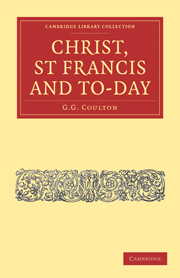Summary
WHERE do we stand, then, if we frankly accept the necessity of a new reformation, based on the recognition that the exclusive spirit in Christianity is falling more and more into open bankruptcy? Exclusiveness is not Christian charity, whatever specious arguments it may find, and with whatever real virtues it may ally itself; for no student of history will deny the real virtues of individuals or churches which have maintained these exclusive doctrines. Man is a strange compound, consistent neither in virtue nor in vice, but living by all sorts of compromises. We must confess of ourselves that we are never likely to live up to our full ideal of good; and fortunately, on the other hand, even a false ideal cannot altogether poison the human mind; the exclusivist theory has its redeeming virtues, or it would never have won its way so far. Even when, as historical students, we are obliged to wage the most implacable war against certain ideas, we must be ready to learn in other ways from their advocates. The pious historians who, for many centuries, have solemnly fed the public with what they knew subconsciously to be more or less false, starting with mere suppressions of inconvenient fact and sometimes ending with something far more definite and deliberate than even the suggestion of falsehood—those pious purveyors of misrepresentation, who can be named by the dozen and are not altogether absent from any party, have often been really religious persons, betrayed into that one bosom-sin by an evil tradition which permits and even prescribes a certain want of scruple in defence of the faith.
- Type
- Chapter
- Information
- Christ, St Francis and To-day , pp. 97 - 113Publisher: Cambridge University PressPrint publication year: 2010First published in: 1919

